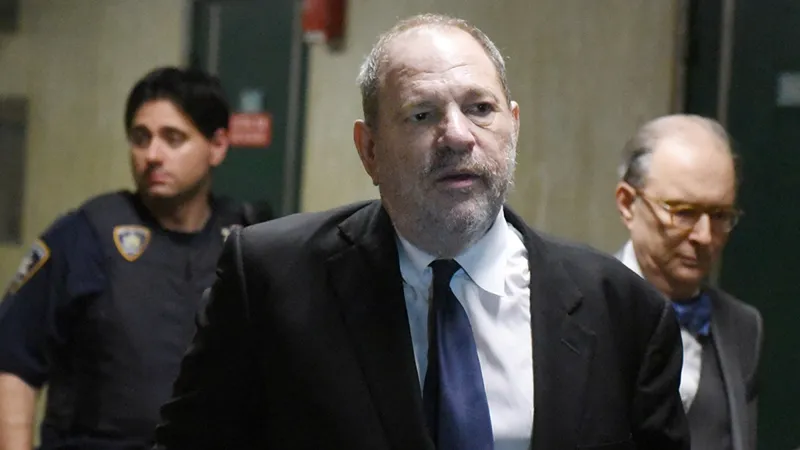In a dramatic turn of events that intertwines legal battles with personal betrayal, Harvey Weinstein has filed a lawsuit against his brother, Bob Weinstein, claiming he was deceived into guaranteeing a massive $45 million loan. Currently behind bars, Weinstein alleges that his brother and Hollywood executive David Glasser orchestrated a scheme to hold him financially responsible for the loan, effectively sabotaging his position within The Weinstein Company. As details of alleged embezzlement and fraudulent transactions emerge, the courtroom becomes a battleground not only for financial reparations but also for family loyalty and accountability in the high-stakes world of Hollywood.
The Family Feud Begins
Harvey Weinstein’s lawsuit against his brother Bob has sparked a family feud that has taken a dramatic turn. This legal battle revolves around a $45 million loan that Harvey claims he was tricked into guaranteeing. While Harvey is currently in prison, he alleges that Bob and Hollywood executive David Glasser conspired against him. Such family disputes can often lead to complicated legal battles, and this case is no different, raising questions about trust and betrayal within the Weinstein family.
In his lawsuit, Harvey argues that Bob deceived him in a way that could ruin him financially. The accusations include claims of embezzlement and mismanagement of funds, which adds layers of complexity to their relationship. Family disagreements, especially over money, can cause lasting rifts, and Harvey’s situation highlights how business and family ties can intertwine, often leading to difficult and painful outcomes.
Allegations of Deception
Harvey Weinstein believes he was misled into signing the loan agreement, which he claims was part of a larger scheme to push him out of the company. He suggests that his brother Bob and Glasser manipulated the situation for their gain. This kind of deception is not uncommon in business, where individuals may sometimes prioritize profit over family loyalty, leading to serious repercussions for all involved.
The lawsuit points to specific financial transactions that Harvey feels were fraudulent. He alleges that Bob withdrew millions and that Glasser awarded himself substantial bonuses while he was unaware of the mismanagement. These allegations raise concerns about ethical practices in business and the importance of transparency, especially when family members are involved.
The Financial Fallout
The fallout from the alleged financial conspiracy is significant, not just for Harvey but for The Weinstein Company as well. The company has reportedly defaulted on the $45 million loan, which could lead to serious financial consequences. This situation highlights the risks of lending in the entertainment industry, where fortunes can change rapidly, and the impact of personal disputes can extend to business operations.
With the lender now pursuing legal action against the company, the stakes are high. Harvey’s personal liability for the loan raises questions about his future and the sustainability of the company. This case serves as a reminder of how intertwined personal and professional lives can be, especially in high-stakes environments like Hollywood.
Bob Weinstein’s Defense
In response to Harvey’s allegations, Bob Weinstein’s attorney has asserted that the claims are ‘entirely without merit.’ This defense underscores the complexity of legal battles, where each party presents their version of events. Bob’s stance reflects the idea that in family disputes, perspectives can vary wildly, often leading to intense legal confrontations.
Bob’s defense also emphasizes the importance of due process in legal matters. As the case unfolds, both sides will have the opportunity to present evidence and arguments. This highlights that even within families, accusations can lead to serious legal ramifications, and the truth may only come out through the judicial process.
The Role of Executives in the Scandal
David Glasser, the Hollywood executive mentioned in the lawsuit, plays a key role in the allegations. Harvey claims that Glasser, along with Bob, was involved in a conspiracy that led to his financial downfall. This scenario raises important questions about the responsibilities of executives in managing company finances and the ethical implications of their decisions.
The involvement of high-profile executives adds another layer of intrigue to this case. It serves as a reminder that those in power must act responsibly and transparently, as their actions can have far-reaching consequences. The scrutiny of their roles in this scandal could lead to broader discussions about accountability in the entertainment industry.
The Impact on The Weinstein Company
The ongoing legal battle and allegations against Harvey and his brother could have significant implications for The Weinstein Company. With the company facing a default on the loan, its financial stability is at risk, which could affect employees and stakeholders. This situation serves as a cautionary tale about the importance of sound financial practices in business.
As the company grapples with these challenges, the public’s perception may also shift. The Weinstein Company’s reputation has already been impacted by past controversies, and this lawsuit could further complicate its recovery. The intertwining of personal and corporate crises emphasizes the need for clear boundaries in business.
Looking Ahead: The Legal Proceedings
As the lawsuit progresses, both Harvey and Bob will have to navigate the complexities of the legal system. The proceedings will likely reveal more details about the alleged financial misconduct and the dynamics of their relationship. Legal battles can be lengthy, and this case is no exception, as it unfolds in the public eye.
The outcome of this lawsuit could set important precedents in the realms of business and family law. It will be interesting to see how the courts address the claims of deception and financial mismanagement. As the legal process continues, many will be watching closely to see how this story develops.
Frequently Asked Questions
Why is Harvey Weinstein suing his brother?
Harvey Weinstein is suing his brother Bob for allegedly misleading him into guaranteeing a $45 million loan, which he claims was part of a financial scheme.
What does Weinstein accuse Bob and Glasser of doing?
Weinstein accuses Bob and David Glasser of orchestrating a conspiracy to make him liable for the loan and embezzling funds from the company.
How much money does Weinstein claim Bob embezzled?
Weinstein claims that Bob embezzled at least $6 million from The Weinstein Company.
What has the lender claimed regarding the loan?
The lender, AI International Holdings, claims that The Weinstein Company defaulted on the $45 million loan and has filed a lawsuit.
What is the response from Bob’s attorney regarding the lawsuit?
Bob’s attorney, Brian Kohn, stated that the allegations made by Weinstein are entirely without merit.
What did Weinstein discover about his company’s finances?
Weinstein expressed shock at discovering alleged fraudulent transactions and claims executives contributed to his downfall.
What role does David Glasser play in this lawsuit?
David Glasser is named in the lawsuit as a Hollywood executive who allegedly conspired with Bob against Weinstein.
Summary
Harvey Weinstein has filed a lawsuit against his brother, Bob Weinstein, claiming he was tricked into guaranteeing a $45 million loan while in prison. He alleges that Bob and Hollywood executive David Glasser conspired to make him responsible for the loan to force him out of his company. Weinstein accuses Bob of misusing funds, including taking $6 million, while Glasser received $5 million in bonuses. He believes these actions contributed to his downfall. The lender has sued The Weinstein Company for defaulting on the loan, and Bob’s lawyer claims the allegations are baseless.




